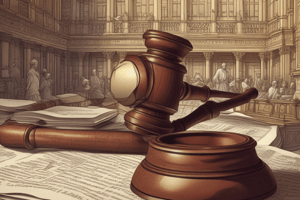Podcast
Questions and Answers
What distinguishes Supreme Legislation from other types of legislation?
What distinguishes Supreme Legislation from other types of legislation?
- It is made by self-governing bodies
- It is applicable only in territories under foreign rule
- It is enacted by authorities below the supreme level
- It is adopted by the highest power in the state (correct)
Which type of legislation is enacted by authorities below the supreme level?
Which type of legislation is enacted by authorities below the supreme level?
- Colonial Legislation
- Executive Legislation
- Subordinate Legislation (correct)
- Autonomous Legislation
Which type of legislation is made by self-governing bodies or institutions?
Which type of legislation is made by self-governing bodies or institutions?
- Subordinate Legislation
- Colonial Legislation
- Supreme Legislation
- Autonomous Legislation (correct)
What distinguishes Colonial Legislation from other types of legislation?
What distinguishes Colonial Legislation from other types of legislation?
Which type of legislation allows executives to modify existing laws without involving parliament?
Which type of legislation allows executives to modify existing laws without involving parliament?
In legislation, what term refers to laws enacted by self-governing bodies or institutions?
In legislation, what term refers to laws enacted by self-governing bodies or institutions?
Which of the following is NOT a common interpretive method used by judges to clarify ambiguous legal provisions?
Which of the following is NOT a common interpretive method used by judges to clarify ambiguous legal provisions?
What is the primary purpose of amending legislation?
What is the primary purpose of amending legislation?
Which of the following is NOT typically involved in the process of amending legislation?
Which of the following is NOT typically involved in the process of amending legislation?
What is the primary reason for judges to apply interpretive techniques when dealing with legislation?
What is the primary reason for judges to apply interpretive techniques when dealing with legislation?
Which of the following statements about legislation is accurate based on the information provided?
Which of the following statements about legislation is accurate based on the information provided?
Flashcards are hidden until you start studying
Study Notes
Legislation as a Source of Law
Legislation is a crucial aspect of the legal system, serving as a primary source of law. It involves the enactment of laws by a legislative body, which often originates from ideas generated within the organization itself or borrowed from neighboring jurisdictions, international organizations, or other sources. This article explores the three main aspects of legislation—types, interpretation, and amendment—providing insights into how legislation functions and evolves.
Types of Legislation
There are several types of legislation, each with unique characteristics.
- Supreme Legislation: This legislation is adopted by the highest power in the state, representing the ultimate authority in the legislative process.
- Subordinate Legislation: Enacted by authorities below the supreme level, these laws derive their validity and legitimacy from the supreme authority.
- Autonomous Legislation: Made by self-governing bodies or institutions, such as universities, colleges, or railways, whose members possess specific expertise in their respective fields.
- Colonial Legislation: Applicable in territories under foreign domination, these laws are subject to the jurisdiction of the governing state's supreme legislature.
- Executive Legislation: Resulting from legislative powers delegated to executives, this legislation allows them to implement or modify existing laws without the involvement of parliament.
Interpretation of Legislation
Interpreting legislation is a critical task within the legal system. As legislation is often broad in scope and procedure, judges apply interpretive techniques to ensure consistency and predictability in legal outcomes. Interpretative methods include textualism, purposivism, and context-based interpretation, among others. These approaches help clarify the meaning of ambiguous provisions and guide the application of laws in practice.
Amendment of Legislation
Amending legislation involves the process of changing existing laws through parliamentary procedures. This may occur due to changing societal needs or policy shifts. Amendment processes vary across jurisdictions but generally require participation from multiple bodies and stages, including legislative committees, executive approval, and public consultations. The ability to amend legislation allows the legal system to evolve over time and adapt to new circumstances.
Studying That Suits You
Use AI to generate personalized quizzes and flashcards to suit your learning preferences.




